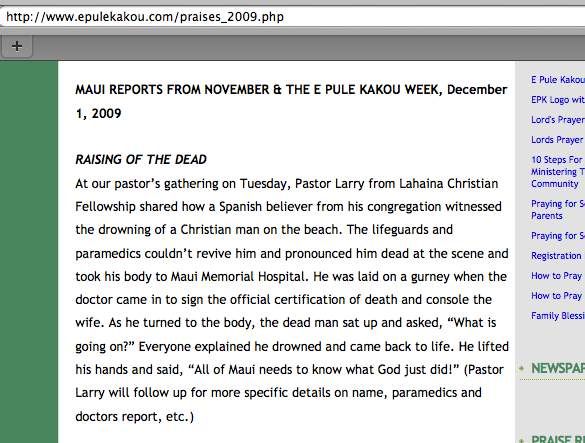|
They Cast Out Demons, Burn "Witchcraft Items," and Field Gubernatorial Candidates
While America has fixated on the Tea Party movement, a radical, right-wing charismatic evangelical movement is burrowing into the power structures of major American cities, such as Newark, NJ [1, 2], and even entire states, such as Alaska and Hawaii. In Hawaii, they claim to be fielding both a Republican and Democratic candidate in the 2010 race for the governor's seat. Both candidates are staunchly opposed to gay marriage and same-sex civil unions as well as legalized abortion, and both can frequently be found onstage together at movement conferences. In 2006, movement leaders paid airfare, conference fees, and lodging costs so Hawaii Lt. Governor Duke Aiona and his wife could attend an Argentina conference of the movement which featured, as a prominent speaker, celebrated exorcist and New Apostolic Reformation leader Cindy Jacobs (see video links in first paragraph for footage of Jacobs in action.) Video footage from the event shows Aiona praying together with the First Lady of Uganda Janet Museveni. Hawaii's Republican Lt. Governor James "Duke" Aiona has publicly dedicated his state and its school to Jesus and declared his desire to "disciple the nations, here in Hawaii and everywhere else." [video 1, right: Duke Aiona dedicates Hawaii to Jesus. video 2, left: Aiona announces his goal of "discipling the nations" at 2009 conference.]
Endorsed by the current Republican candidate for the governorship of Hawaii, Duke Aiona (see video at end of post), E Pule Kakou is a yearly, week-long prayer initiative broadcast on major networks and multiple cable channels in the Hawaiian islands.
This might seem silly to secular America, good grist for a hearty mocking by John Stewart or Stephen Colbert. But there are real-world implications to the meteoric rise of the New Apostolic Reformation. If Sarah Palin runs for president in 2012 we could have a New Apostolic Reformation president, and the Medieval, demon haunted movement is really impacting people's lives. In Hawaii, for example, the right wing charismatic evangelical churches behind E Pule Kakou also helped put Hawaii's current governor, Linda Lingle, into power in 2002. On July 6th 2010, immediately before she vetoed a civil unions bill, HB444, that would have allowed same sex couples in Hawaii the same legal rights as opposite-sex married couples, Lingle invited evangelical anti-gay rights pastors into her executive office for a special prayer. As Hawaii activist Carroll Cox chronicled the event [1], 2, it was reminiscent of the deep South during Segregation except the the state-enforced bigotry was directed not at African-Americans but at gay rights groups - on that day pro-gay right protesters, who were required to get a special use permit and liability insurance to demonstrate in favor of the civil unions bill, were crowded out of an area their permit said they could gather in. Meanwhile the Governor's Sheriff's Office let anti-gay right evangelical Christian demonstrators swarm up to the fifth floor of the Hawaii State House, where they chanted and blew rams' horns for hours outside of Governor Linda Lingle's executive office. A day after vetoing the civil unions bill governor Lingle went on a Hawaii talk radio show and compared same sex marriage to incest. It was a vilification tactic popular on the Christian right, and while she announced her veto the day before, Lingle trotted out another sinister argument also commonly advanced by conservative evangelicals. While announcing her decision, Lingle claimed that the issue at hand, the civil unions bill, was so important that she didn't feel she should decide it by executive decision - Lingle said it should be decided by popular vote. It was deeply hypocritical, because Lingle's blatant favoritism of the anti-civil union protesters undermined her pretense of impartiality, and there were serious Constitutional issues underlying Lingle's excuse. The idea that democratic majorities should be able to vote on the rights of minority groups would have appalled America's founders. Lingle's argument was a bizarre one for her to advance because she's Jewish, and in pre-World War Two Nazi Germany the democratic legislative process was used to strip German Jews of basic citizenship rights. The very point of the American Bill of Rights was to prevent that sort of thing from happening - democratic majorities, whether through voting referendums or via their elective legislative representatives, can't strip minority groups, whether they be gays, Jews, blacks or Hispanics, atheists or Mormons, of basic rights. Leaders of the New Apostolic Reformation claim that all belief systems, both religious and philosophical, that compete with their totalistic, demon-haunted, politicized ideology are illegitimate and under demon influence. Their chosen politicians are rapidly moving into positions of power in American politics, and their prophets have predicted they'll achieve political control of the nation by 2012. [below: Duke Aiona gives prayer for E Pule Kakou 2008]
They Cast Out Demons, Burn "Witchcraft Items," and Field Gubernatorial Candidates | 45 comments (45 topical, 0 hidden)
They Cast Out Demons, Burn "Witchcraft Items," and Field Gubernatorial Candidates | 45 comments (45 topical, 0 hidden)
|
||||||||||||||
| ||||||||||||||




 print page
print page
 They claim to be able to raise the dead and cause miracles, such as the multiplication of Thanksgiving turkey dinners. They
They claim to be able to raise the dead and cause miracles, such as the multiplication of Thanksgiving turkey dinners. They 